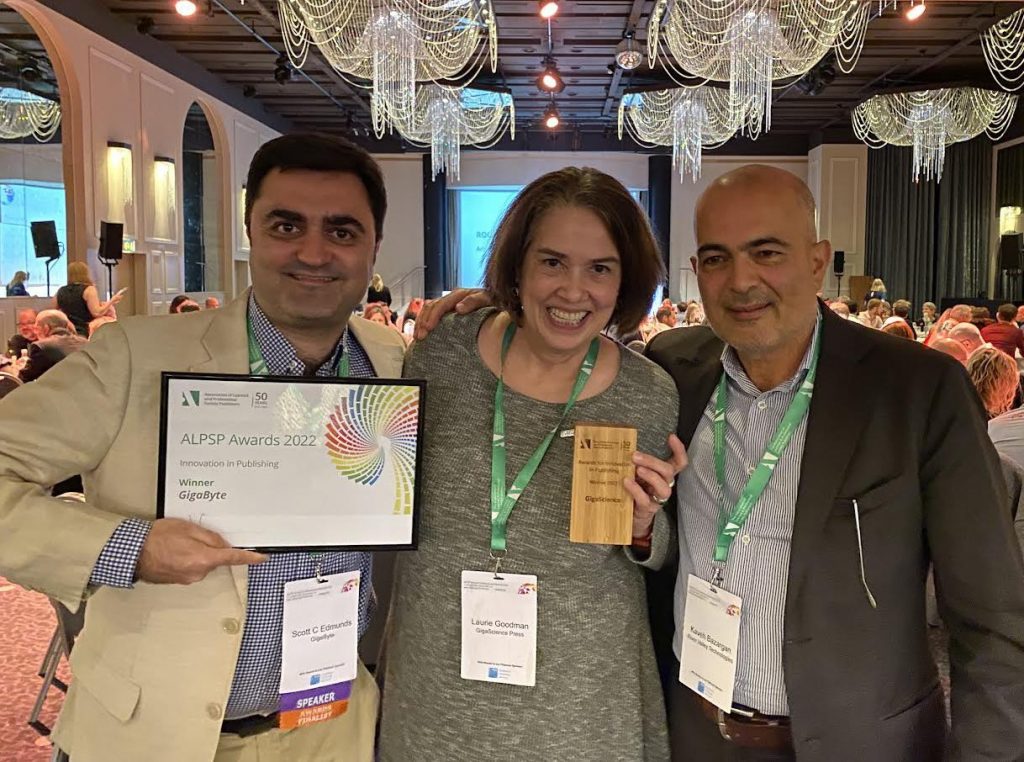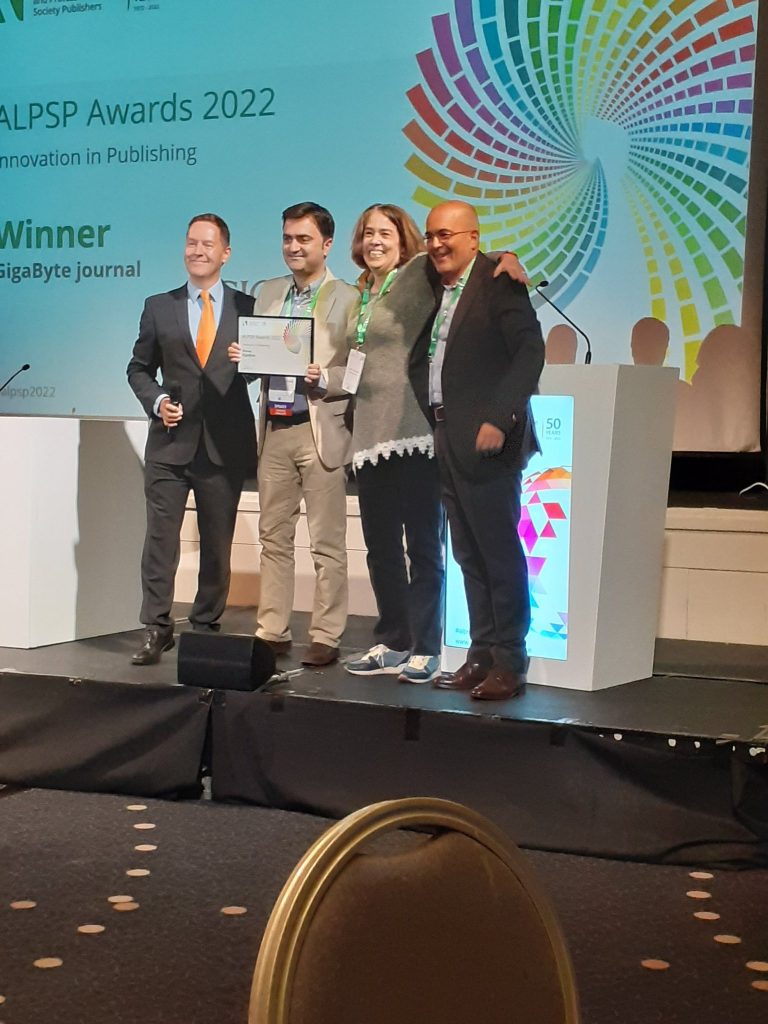GigaByte Wins 2022 ALPSP Innovation Award
GigaByte Journal wins the ALPSP Innovation Award for their interactive articles and tools aimed at fulfilling the UNESCO Recommendation on Open Science

We at GigaScience Press are very pleased to announce that our newest journal GigaByte has won the 2022 ALPSP Award for Innovation in Scholarly Publishing. Presented every year at the meeting of the Association of Learned and Professional Society Publishers, now in its 50th year, this award recognizes the best innovators in professional publishing communities at a time of rapid change in the field. The award was given in recognition of our out-of-the-box solutions to address the UNESCO Recommendation on Open Science, and thus, to open engagement of research and to promote the inclusion of traditionally marginalized scholars. To achieve these goals, GigaScience Press partnered with River Valley Technologies to develop a unique XML-first publishing platform that allows extremely rapid, low-cost article publication. The technology underlying these articles enables the inclusion of a variety of features that let readers interact directly with the data used in the research. In addition, the content and the interface can be presented in any language, making article access highly inclusive.
In November 2021, the UNESCO ratified its Recommendation on Open Science, specifically addressing UNESCO’s aim for “fostering a culture of open science and aligning incentives for open science”. The UNESCO directives cover not only scientific articles, but also scientific data, tools, infrastructure, etc., making them available to everyone, including groups that have typically been ignored in the decision processes in international research and use of all available scientific information.
GigaScience Press has looked to the UNESCO Recommendation on Open Science to serve as a roadmap to identify areas that are essential to include in scientific publishing and communication processes (see our Editorial in GigaScience outlining this work). While the Press has made many inroads in achieving these directives with our first journal, GigaScience, now in its tenth year and also an innovation award winner (winning the PROSE award in 2018), it is our partnership with River Valley Technologies that has opened the way to begin tackling many of the more challenging goals. The publishing and article hosting platform is built-for-purpose, and includes the ability to easily accommodate a host of dynamic interactive tools within the paper, allow the articles to be present in different languages, and more.
Scott Edmunds, Chief Editor of GigaByte, highlighted the significant role of River Valley Technologies for achieving those goals: “XML-first publishing workflows have been talked about for a long time, but it’s fantastic for GigaByte to be acknowledged as the first to demonstrate not only that the system works, but that it has real-world benefits, such as reducing costs and increasing accessibility and interactivity in scientific publishing. An excellent example of its use is that this system, due to its high speed and low cost, enabled the recent publication of a series on Vectors of Human Disease, sponsored by the TDR, the Special Programme for Research and Training in Tropical Diseases, hosted at the World Health Organization. More than half of the submissions were from Latin America, and our ability to publish these articles in our multilingual format further broke down barriers, allowing Portuguese and Spanish speakers to better comprehend the implications of important work relating to the public health of their communities.”

The publishing platform is practically automated, thus drastically reducing publication costs. The cost savings can be passed on to the researcher, opening the door for many researchers around the world previously unable to afford publishing costs. The current article processing charge (APC) for GigaByte is $350 USD (with waivers provided for researchers where appropriate.) The industry average APC is some $2,000 USD, with some journal APCs costing more than $10,000 per article.
GigaScience Press Publishing Director Laurie Goodman said: “Although the publishing industry is working hard to become more inclusive, language and cost barriers remain substantial. International journals are typically presented only in English, impacting a large percent of scientists in non-English speaking countries, even in an open-access environment. In addition, high APCs, even with discounts, make it extremely difficult for researchers in less-well-funded laboratories from publishing their work and their achievements.”

While our GigaByte articles can still be downloaded as an industry-standard PDF, the article publication focus is on the XML version of the paper. This XML links to the research data and the code, to interactive views of the results, to different languages and views, and to all of the dynamic features. As well as improving the readability for machines (see our text and data mining portal), the platform allows integrated language support and options for human readers to select how they want to view papers including, for example, the ability to view the article in a dyslexic-friendly font.
River Valley Director Kaveh Bazargan said: “It has been a pleasure working with GigaByte. Their openness and their appetite to push the boundaries of publishing has allowed us to deploy our unique XML-first technology to embed complex and interactive objects such as immersive 3D content, and simultaneously cutting time and cost of publishing. Articles are published within 24 hours of acceptance and are fully accessible.”
GigaByte shared first place with Charlesworth Gateway, which provides a more efficient means of communicating between editors and Chinese authors during the submission and publication process. David Sommer, Chair of the judging panel and co-founder at Kudos said of the winners and goals of the award: “This year’s winners highlight how our industry is responding to the changing needs of authors and researchers together with the move towards making the scholarly record accessible to a broader audience worldwide.”